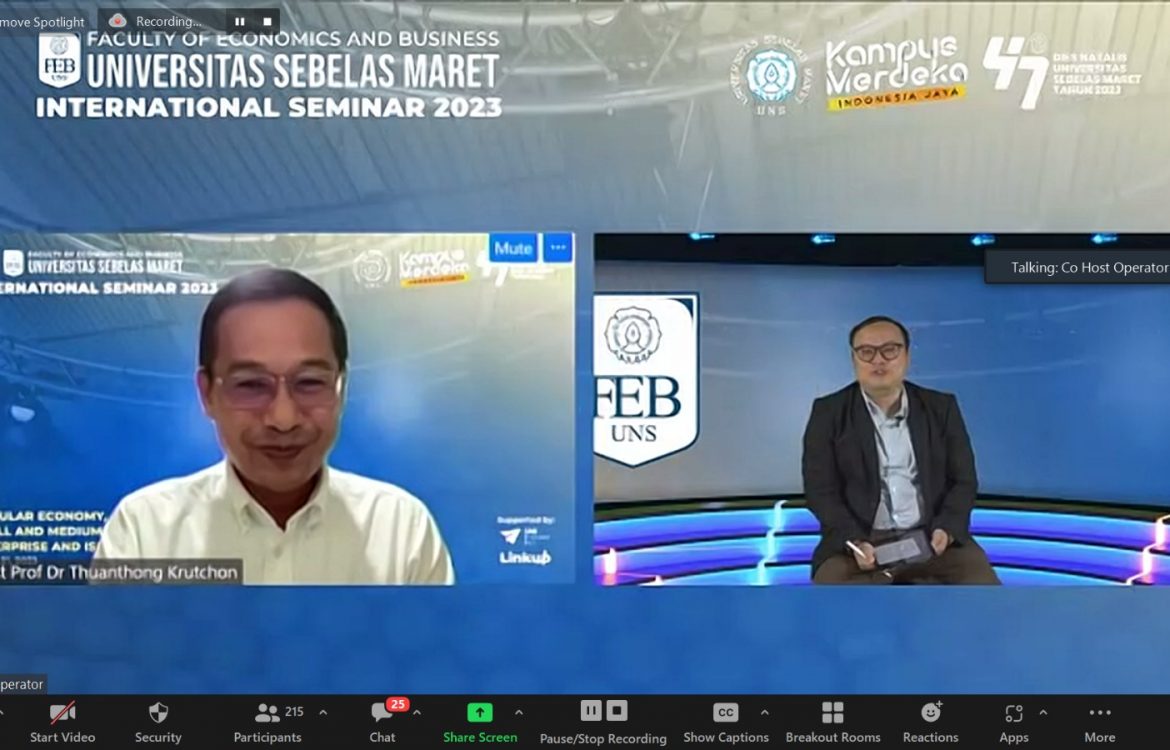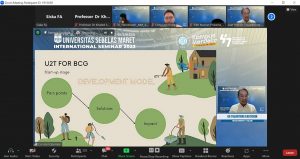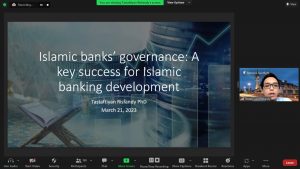
FEB UNS Successfully Hosted International Seminar 2023: A Lecture on Circular Economy, Small and Medium-Sized Enterprise and Islam
Faculty of Economics and Business (FEB) Universitas Sebelas Maret (UNS) Surakarta, presented five international academics in the International Seminar 2023: A Lecture on Circular Economy, Small and Medium-Sized Enterprise and Islam.
The agenda organized as part of the 47th UNS Anniversary celebration, was conducted virtually on Tuesday (03/21/2023). The agenda supported by the UNS Innovation Hub and LinkUp! was attended by more than 250 participants consisting of lecturers, students, and general participants.
Opening the seminar, Prof. Djoko Suhardjanto, the Dean of FEB UNS, expressed his gratitude to all speakers who have been willing to attend and deliver materials at the FEB UNS 2023 International Seminar. “I am thrilled because the current occasion can present an opportunity for us to learn from each other regarding ideas and best practices in the circular economy and Islam. I hope the participants can be actively involved in today’s discussion,” said Prof. Djoko. Prof. Djoko also hopes that today’s agenda will result in meaningful collaboration.
 The first keynote speaker who delivered the material at this seminar was Prof. Khaleed Soufani from the University of Cambridge, UK, presenting topics related to the relationship between sustainability, circular economy, impact investing, and Islam. According to him, the current world conditions are filled with disruptions in the field of technology, social, and the environment.
The first keynote speaker who delivered the material at this seminar was Prof. Khaleed Soufani from the University of Cambridge, UK, presenting topics related to the relationship between sustainability, circular economy, impact investing, and Islam. According to him, the current world conditions are filled with disruptions in the field of technology, social, and the environment.
“We are currently in the position of over-consumption, over-producing, and over-trading, these three conditions cause large amounts of waste and negatively affect environmental conditions,” explained Prof. Khaleed.
The second keynote speaker who attended the event virtually was from Syarif Hidayatullah State Islamic University, namely Prof. Abdul Mu’ti. In his presentation, Prof. Mu’ti revealed that Islam is a complete religion that teaches and regulates many things in human life.
“The Islamic economy teaches us the importance of material property as part of the wealth and prosperity of Muslims. The protection of wealth remains part of Islamic teachings, although Islam also prohibits the accumulation of wealth in one person or small group, which then ignores the problems that arise in society,” explained Prof. Mu’ti.
In the second session of the seminar, three academics delivered different materials in sequence in a plenary session led by Dr. Putra Pamungkas from FEB UNS. The three speakers invited for this session were Assoc. Prof. Dr. Thuanthong Krutchon from Thaksin University Thailand, Dr. Rudi Natamiharja from the University of Lampung, and Dr. Tastaftiyan Risfandy from FEB UNS.
For about thirty minutes, Assoc. Prof. Dr. Thuanthong shared his experience in implementing circular economy in Thailand, covering three aspects namely Bioeconomy, Circular Economy, and Green Economy (BCG). The implementation of BCG is also connected to national development targets.
Following material from Dr. Thuanthong, Dr. Rudi explained the topic related to legal protection for MSMEs in Indonesia. In his presentation entitled ‘Indonesian Legal Guarantee on the Welfare of MSMEs,’ Dr. Rudi discussed in detail the regulations that form the basis of legal protection for MSMEs both at the international, national, and legal protection for MSME rights in carrying out economic activities in Indonesia.
The last speaker, Dr. Tastafiyan presented the material entitled “Islamic Banks’ Governance: A key success for Islamic banking development.”
 Starting the presentation, Dr. Tastaftiyan stated that, “Islamic banks were formed to reduce the distance between the poor and the rich. Moreover, Islamic banks also serves the role to provide credit for MSMEs. In terms of the development of Islamic banks, there are many aspects that need to be improved,” said Dr. Tastafiyan.
Starting the presentation, Dr. Tastaftiyan stated that, “Islamic banks were formed to reduce the distance between the poor and the rich. Moreover, Islamic banks also serves the role to provide credit for MSMEs. In terms of the development of Islamic banks, there are many aspects that need to be improved,” said Dr. Tastafiyan.
In this presentation, Dr. Tastaftiyan also shared the results of his research entitled ‘Excess remuneration, governance, and risk-taking in Islamic banks,’ in collaboration with Prof. M. Kabir Hassan. He revealed that the motivation for the study is due to the high level of remuneration for company executives.
“The implication of the results of this research is that good monitoring activities carried out by the Board of Directors and the Sharia Board can reduce risk-taking incentives, which then encourage the progress of Islamic banks. For this reason, policymakers need to establish a good remuneration scheme, especially for BoD and SSB members.”
The seminar, which lasted about three hours, went seamlessly. Participants are very enthusiastic about following the course of the seminar proven by the active discussion between participants with all the speakers

